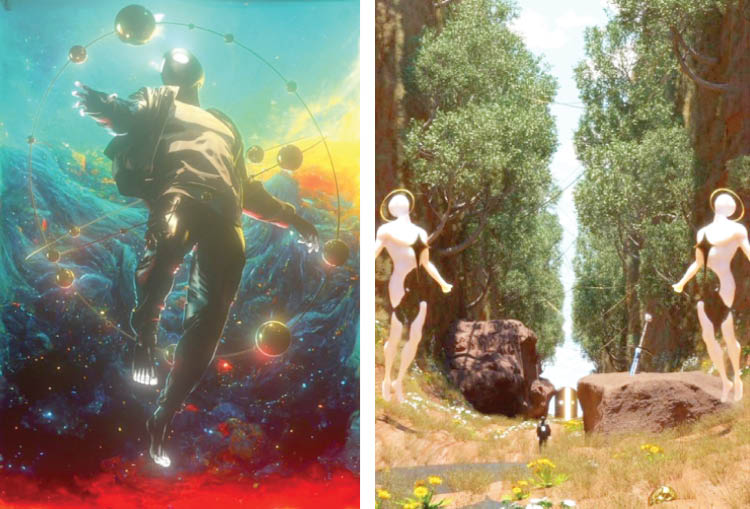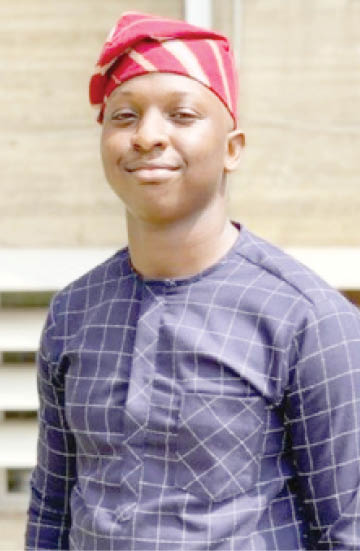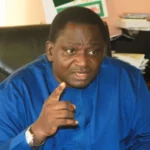Rotimi Michael Gbafe is a Lagos-based artist with a knack for creating 3D art. In this interview with Daily Trust on Sunday, Gbafe highlights his passion and journey as a 3D artist.
Can you walk us through your portfolio and highlight one project that you are particularly proud of?
So far, I have embarked on quite a number of projects in the course of my journey as a 3D artist. In each of these projects, I explored themes, use of characters and character variants and the use of environments in my work. One project I am most proud of is the EVE COLLABORATIONS project which I embarked on in March of last year that featured the work of more than 100 artists in collaboration with me.
What inspired you to pursue a career in 3D art, and how has your style evolved over time?
I was inspired by the works of Beeple – a renowned 3D artist. I discovered his work in late 2018, and I was in awe of his talent to the point where I believed I could do the same thing. Previously, I attempted to try my hands at graphic design, but switching to 3D completely changed the course of my trajectory. And so, in June 2019, I created my first ever 3D piece titled “AWAKENING”. Over the years, I’ve drawn inspiration from the work of other artists, and learned a ton of stuff from watching YouTube videos, whilst tinkering with objects from within the software I used (Cinema 4D), and using external render engine plugins, to get a better understanding of things and to further improve the quality of each scene I create.
As I gained knowledge, I then branched out to using other software like Daz Studio, Zbrush and Marvellous Designer to enhance my skillset and workflow as a 3D artist.
Investigation: Inside Abuja’s Kidney ‘Market’ Where The Rich Prey On The Poor
Sokoto probe panel: I’m ready to return vehicles auctioned to me – Former dep gov

How do you approach collaborating with other artists or team members on a project?
When it comes to collaborating on an idea with another artist, I first express interest before I communicate my ideas and, depending on the medium, how both of our styles would combine in the resulting piece. I usually take a lot of time on collaborations, so it gives me and the other artist enough time to create the elements we would use on a piece.
What is your creative process when starting a new project? How do you generate and develop ideas?
My creative process is never straightforward per se. It usually involves me playing around with random stuff until I have an idea for a new piece, and then sometimes I create pieces based on an idea I might have had in my thoughts for a while. I often don’t name some of my pieces till after I finish creating them. And I barely use any references or sketches, so most of the ideas are usually from my head. And I make it a habit to listen to music frequently while I create, to give me a steady train of thought.
How do you balance creativity with meeting project deadlines and client expectations?
For this, I usually try to communicate my ideas beforehand to prevent clash of ideas or creative differences while I’m working on the project. I also communicate how much time I will need and stress on the fact that it may take longer, because finding and using resources to carry out ideas is very tasking, especially if you’re new to using those resources.
Describe a situation where you had to adapt your artistic style to meet a client’s specific vision?
On one of the projects I worked on for a client, I was required to create a cartoon-like character/mascot from scratch, rig and then make several poses of it. It was very tasking as I had not done anything of that nature before, and so I was new to a lot of things and I had to adapt to using different tools while creating the character.
How do you prioritize and manage your time when working on multiple projects simultaneously?
I’d rather prefer to do them one after the other. Creating multiple pieces of work simultaneously usually amps up my anxiety (due to past experiences) and because of that, I pumped the brakes on that, and rather take things one at a time.
In your opinion, what is the most challenging aspect of being a 3D artist, and how do you tackle it?
The most challenging aspect of being a 3D artist is having the right gear/tools. To be able to create and/or animate 3D artworks/characters/assets or anything 3D related, requires having the right tools. Most times, people can’t do so because to get the right gear and tools would cost lots of money. I’ve had to cut back on a lot of ideas I had for artworks simply because I lacked the tools to do so, and there’s only so much free stuff you can download. I usually find workarounds to what I can’t use in scenes and when it comes to characters, I try to create from scratch or tweak a pre-existing character. To get new devices these days is expensive, so I just manage with what I have.
How do you overcome creative blocks and maintain motivation during long or challenging projects?
To overcome creative blocks, I usually take breaks or listen to music. It gives me time to ruminate on new ideas and such. I don’t do a lot of projects though, but for challenging pieces, I make sure to take my time with them, and if they prove too difficult or I don’t flow with the process anymore, I either come back to them at a later date or scrap them entirely.
Can you discuss a personal or passionate project you’ve worked on outside of professional obligations?
Almost all the projects I’ve embarked on are personal projects. I don’t do a lot of professional/client work since I’m still a student. One of the projects that I worked on, and I’m still working on, is worlds. This project consists of more than 70 works of art with the theme of exploration of different landscapes. It’s the project where my representative character/avatar explores the different w0rlds he has created, often times being the backdrop of the w0rld itself. The project is still in continuum and would likely serve as my creative style.
Where do you see yourself in the next five years as a 3D artist?
In the near future, I see myself as a senior character artist and animator, and I hope to create a game based off my work someday.
How do you handle feedback and revisions from clients, and can you share an example of turning constructive criticism into a positive outcome?
I appreciate all kinds of feedback on my work, especially if there are any errors I can correct or elements I can change. It poses a problem when the client doesn’t have specific requirements or cannot communicate exactly what they want, so I always try to communicate to them, whether it’ll be possible to meet those requirements or not, and how much more time it’ll take.

 Join Daily Trust WhatsApp Community For Quick Access To News and Happenings Around You.
Join Daily Trust WhatsApp Community For Quick Access To News and Happenings Around You.

